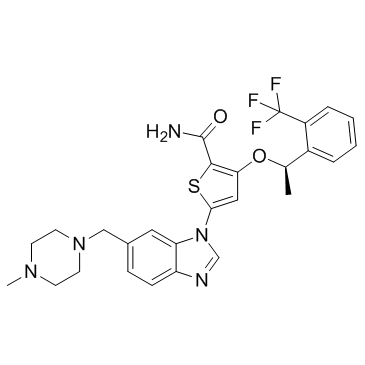929095-18-1
| Name | 5-[6-[(4-methylpiperazin-1-yl)methyl]benzimidazol-1-yl]-3-[(1R)-1-[2-(trifluoromethyl)phenyl]ethoxy]thiophene-2-carboxamide |
|---|---|
| Synonyms |
5-{6-[(4-Methylpiperazin-1-yl)methyl]-1H-benzimidazol-1-yl}-3-{(1R)-1-[2-(trifluoromethyl)phenyl]ethoxy}thiophene-2-carboxamide
5-{6-[(4-Methyl-1-piperazinyl)methyl]-1H-benzimidazol-1-yl}-3-{(1R)-1-[2-(trifluoromethyl)phenyl]ethoxy}-2-thiophenecarboxamide GSK-461364 GSK461364 |
| Description | GSK461364 is a selective, reversible and ATP-competitive Polo-like kinase 1 (PLK1) inhibitor with a Ki value of 2.2 nM. |
|---|---|
| Related Catalog | |
| Target |
PLK1:2.2 nM (Ki) |
| In Vitro | GSK461364 is a potent, selective, and reversible ATP-competitive Plk1 inhibitor (Ki, 2.2 nM) with at least 390-fold greater selectivity for Plk1 than for Plk2 and Plk3 and 1,000-fold greater selectivity than for a panel of 48 other kinases[1]. GSK461364 (GSK461364A, 250 nM) inhibiting plk1 causes prolonged mitotic delay, aberrant mitotic exit, and p53 activation in A549 and PL45 cells. Knockdown of p53 significantly enhances the sensitivity of the cells to GSK461364A (30 or 300 nM) in preventing outgrowth in A549 and NCI-H460 cells, compared with cells with nonsilencing control siRNA[2]. GSK461364 can inhibits cell growth of most proliferating cancer cell lines, and suppresses 89% of cancer cell line (66 of 74 lines) proliferation, with a GI50 (concentration required to inhibit 50% cell growth) of ≤100 nM. GSK461364 (GSK461364A, >20 nM) blocks cells in G2-M phase with reduction of cells in G1 phase of A549 lung carcinoma line. GSK461364 (10-250 nM) blocks cells in G2 and M phases of the cell cycle and causes M-phase caspase-3/caspase-7 activation in cancer cells[3]. GSK461364 (0.5-2 μM) decreases level of PLK1 and pCDC25C, and cuases a dose- and time-dependent increase in pHisH3, an indicator of mitotic arrest in OS cell lines[4]. |
| In Vivo | GSK461364 (50 mg/kg) exhibits various degrees of tumor growth delay (TGD) in multiple xenograft tumor models by i.p. one dose every 2 days repeated twelve times (q2d×12)[1]. |
| Kinase Assay | Kinase reactions are performed in a final assay volume of 10 μL using the Z'-Lyte Assay kit (Ser/Thr peptide 16). Briefly, reactions contained 50 mM HEPES (pH 7.5), 10 mM MgCl2, 1 mM EGTA, 1 mM DTT, 0.01% Brij 35, 0.01 mg/mL casein, 200 μM ATP, 200 μM Polo Box peptide (NH2-MAGPMQS[pT]PLNGAKK-OH), and 6 nM recombinant Plk1 (H6-tev-PLK 1-603). Plk1 is preincubated for 60 min in the presence or absence of 0 to 1,000 nM GSK461364. Reactions are then initiated by the addition of 2 μM peptide. After 15 min at 23°C, reactions are quenched and processed according the Z'-Lyte protocol and read on an plate reader. Raw fluorescence values are converted to concentration of product formed using substrate and product standards. IC50 values are determined using a two-parameter fit (Hill coefficient and IC50) using GraFit software. Because the potency of inhibition for GSK461364 is observed to vary as a function of the ATP concentration in a manner consistent with an ATP-competitive mode of inhibition, an upper limit for the Ki*app for GSK461364 is determined by applying the Cheng-Prusoff relationship for a competitive inhibitor (ATP Km*app=16 μM) to the IC50 value obtained with 60 min preincubation of GSK461364. |
| Cell Assay | Cell lines grow in the recommended media at 37°C, 5% CO2 in a humidified incubator. Cells are plated in triplicate 96-well microtiter plates at 1,000 cells per well in culture media. GSK461364 (GSK461364A) dissolved in DMSO or negative control (0.1% DMSO) are added the following day, and one plate is harvested with 50 μL of CellTiter-Glo for a time 0 (T=0) measurement. |
| Animal Admin | Cells are implanted in Nude mice and grown as tumor xenografts. Dosing began when tumors achieve appr 100 mm3. GSK461364 (GSK461364A) or the vehicle [4% DMA/Cremaphore (50:50), pH 5.6] is given i.p. to mice every 2 d (q2d×6, q2d×12) or every 4 d (q4d×3) at nominal dose levels of 25, 50, and 100 mg/kg/dose. Results are reported as median tumor volume for n=7 to 8 mice. Paclitaxel (30 mg/kg i.v.; q4d×3) is used as a positive control for comparison. Tumors are measured thrice a week with Vernier calipers, and tumor volume is calculated from two-dimensional measurements using an equation approximating the volume of a prolate ellipsoid [tumor volume mm3=(length × width2) × 0.5]. The maximum tolerated dose is defined as the highest dose that produces >20% mortality or >20% weight loss (appr 4 g). Antitumor activity is defined as tumor growth delay (TGD), partial regression (PR), or complete regression (CR). TGD represents the time differential between the treated and control tumors to reach a predetermined tumor volume of 1,000 mm3. PR is defined as a decrease in an individual tumor volume to one-half the initial starting volume for at least 1 wk (three consecutive measurements). CR is defined as a decrease in an individual tumor volume to <13 mm3 for at least 1 wk. |
| References |
| Density | 1.4±0.1 g/cm3 |
|---|---|
| Boiling Point | 658.0±65.0 °C at 760 mmHg |
| Molecular Formula | C27H28F3N5O2S |
| Molecular Weight | 543.604 |
| Flash Point | 351.7±34.3 °C |
| Exact Mass | 543.191589 |
| PSA | 104.86000 |
| LogP | 3.34 |
| Vapour Pressure | 0.0±2.0 mmHg at 25°C |
| Index of Refraction | 1.645 |
| Storage condition | -20℃ |
